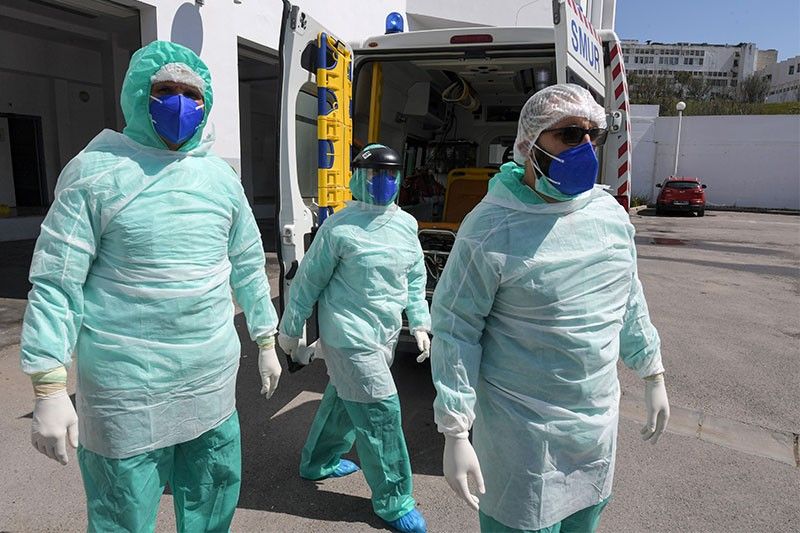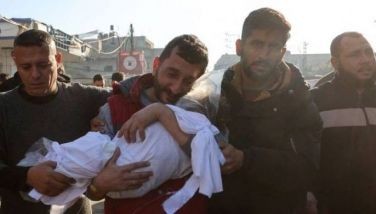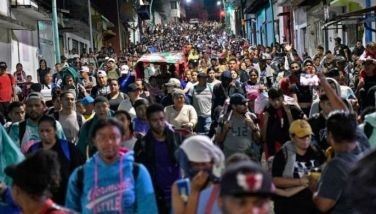World short of six million nurses, WHO says

GENEVA, Switzerland — As COVID-19 captures global headlines, the World Health Organization (WHO) warned Tuesday that the world needs nearly six million nurses.
The UN's health agency along with partners Nursing Now and the International Council of Nurses (ICN) underscored in a report the crucial role played by nurses, who make up more than half of all health workers worldwide.
"Nurses are the backbone of any health system," WHO chief Tedros Adhanom Ghebreyesus said in a statement.
"Today, many nurses find themselves on the frontline in the battle against COVID-19," he noted, adding that it was vital they "get the support they need to keep the world healthy."
The report said that there are just under 28 million nurses on the planet.
In the five years leading up to 2018, the number grew by 4.7 million.
"But this still leaves a global shortfall of 5.9 million," the WHO said, pointing out that the greatest gaps were in poorer countries in Africa, southeast Asia, the Middle East and parts of South America.
The report urged countries to identify gaps in their nursing workforce and invest in nursing education, jobs and leadership.
Shortages 'exhaust workforce'
ICN chief executive Howard Catton told a virtual briefing that infection rates, medication errors and mortality rates "are all higher where there are too few nurses".
Furthermore, "shortages exhaust our current nursing workforce", he added.
In fighting the pandemic, Mary Watkins, who co-chaired the report for Nursing Now, called for urgent investment in virus tests for healthcare workers.
"We have a very high proportion of healthcare workers not going to work because they're afraid that they've been infected and that they can't prove that they have not got the infection -- or that they've had it, and they're over it," she said.
Catton said that 23 nurses had died in Italy and cited figures suggesting that around 100 health workers had died around the world.
Meanwhile he said there were reports of nine percent of health workers being infected in Italy and "we're now hearing of rates of infections up to 14 percent in Spain".
He also cited reports of "completely unacceptable and reprehensible" attacks on health workers battling COVID-19, largely due to ignorance about their work, combined with countries not doing enough to protect them.
"COVID is putting it into a very stark lens for us all," he said, though he welcomed the growing appreciation in some countries of nurse's work.
Catton said that could help change perceptions of the value of nursing — which in turn might help make it a more attractive profession.
Male recruitment
Beyond COVID-19, Watkins said many wealthier countries were not producing enough nurses to meet their own healthcare needs, and were therefore reliant on migration, exacerbating shortages in poorer countries.
"Eighty percent of the world's nurses only currently serve 50 percent of the world's population," she noted.
Catton warned of risks that richer countries would rely on the Philippines and India to "supply the world with nurses", which could lead to significant shortages in India.
The experts said nursing remains female-dominated and needed to recruit more men.
"There is clear evidence that where there are more men in any profession in the world, the pay and the terms and conditions improve," Watkins said.
Follow this page for updates on a mysterious pneumonia outbreak that has struck dozens of people in China.
New Zealand Prime Minister Chris Hipkins says on Sunday that he had contracted COVID-19, testing positive at a key point in his flailing campaign for re-election.
Hipkins saYS on his official social media feed that he would need to isolate for up to five days -- less than two weeks before his country's general election.
The leader of the centre-left Labour Party said he started to experience cold symptoms on Saturday and had cancelled most of his weekend engagements. — AFP
The World Health Organization and US health authorities say Friday they are closely monitoring a new variant of COVID-19, although the potential impact of BA.2.86 is currently unknown.
The WHO classified the new variant as one under surveillance "due to the large number (more than 30) of spike gene mutations it carries", it wrote in a bulletin about the pandemic late Thursday.
So far, the variant has only been detected in Israel, Denmark and the United States. — AFP
The World Health Organization says on Friday that the number of new COVID-19 cases reported worldwide rose by 80% in the last month, days after designating a new "variant of interest".
The WHO declared in May that Covid is no longer a global health emergency, but has warned that the virus will continue to circulate and mutate, causing occasional spikes in infections, hospitalisations and deaths.
In its weekly update, the UN agency said that nations reported nearly 1.5 million new cases from July 10 to August 6, an 80% increase compared to the previous 28 days. — AFP
The head of US intelligence says that there was no evidence that the COVID-19 virus was created in the Chinese government's Wuhan research lab.
In a declassified report, the Office of the Director of National Intelligence (ODNI) says they had no information backing recent claims that three scientists at the lab were some of the very first infected with COVID-19 and may have created the virus themselves.
Drawing on intelligence collected by various member agencies of the US intelligence community (IC), the ODNI report says some scientists at the Wuhan lab had done genetic engineering of coronaviruses similar to COVID-19. — AFP
Boris Johnson deliberately misled MPs over Covid lockdown-breaking parties in Downing Street when he was prime minister, a UK parliament committee ruled on Thursday.
The cross-party Privileges Committee said Johnson, 58, would have been suspended as an MP for 90 days for "repeated contempts (of parliament) and for seeking to undermine the parliamentary process".
But he avoided any formal sanction by his peers in the House of Commons by resigning as an MP last week.
In his resignation statement last Friday, Johnson pre-empted publication of the committee's conclusions, claiming a political stitch-up, even though the body has a majority from his own party.
He was unrepentant again on Thursday, accusing the committee of being "anti-democratic... to bring about what is intended to be the final knife-thrust in a protracted political assassination".
Calling it "beneath contempt", he said it was "for the people of this to decide who sits in parliament, not Harriet Harman", the veteran opposition Labour MP who chaired the seven-person committee. — AFP
- Latest
- Trending

































